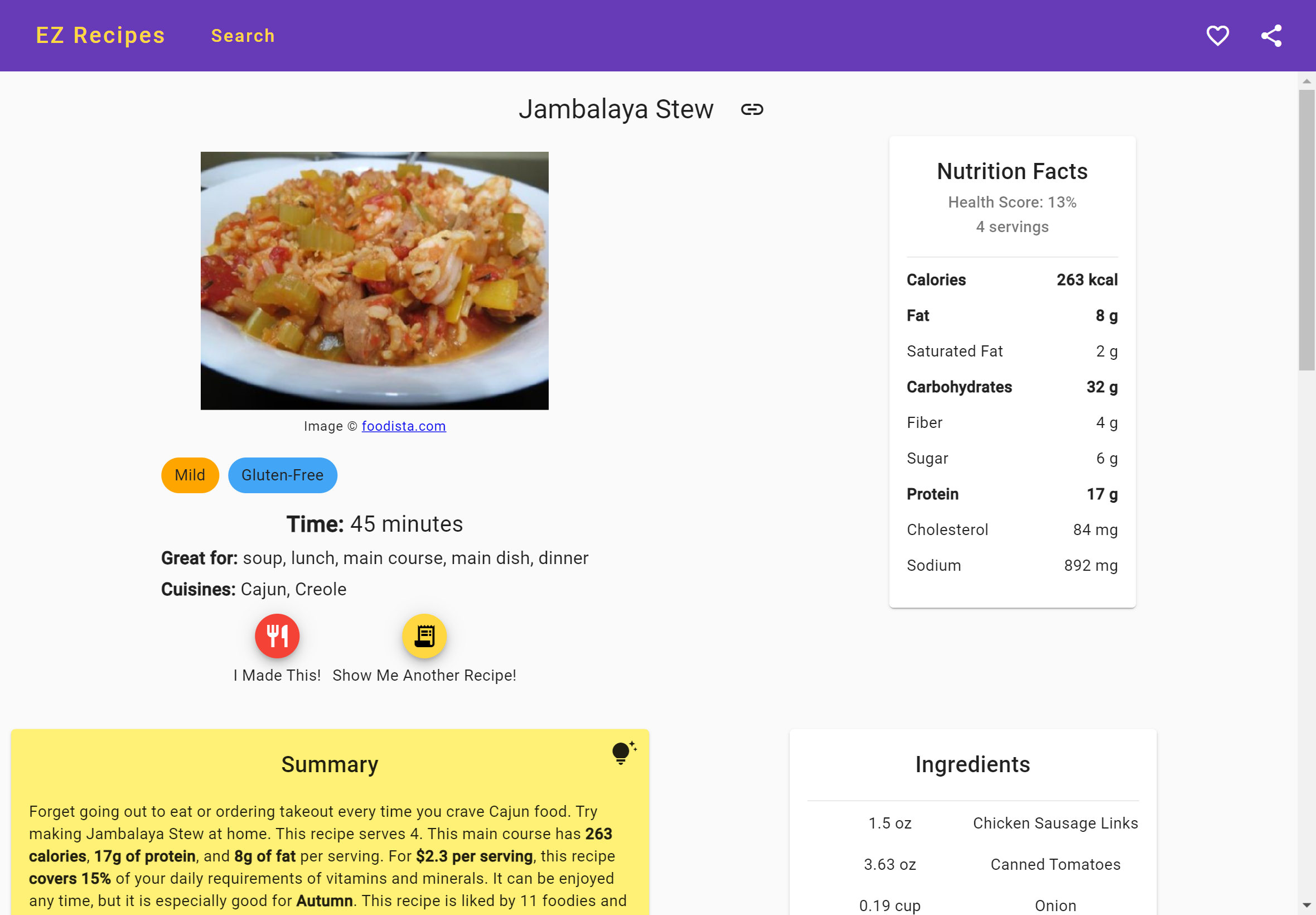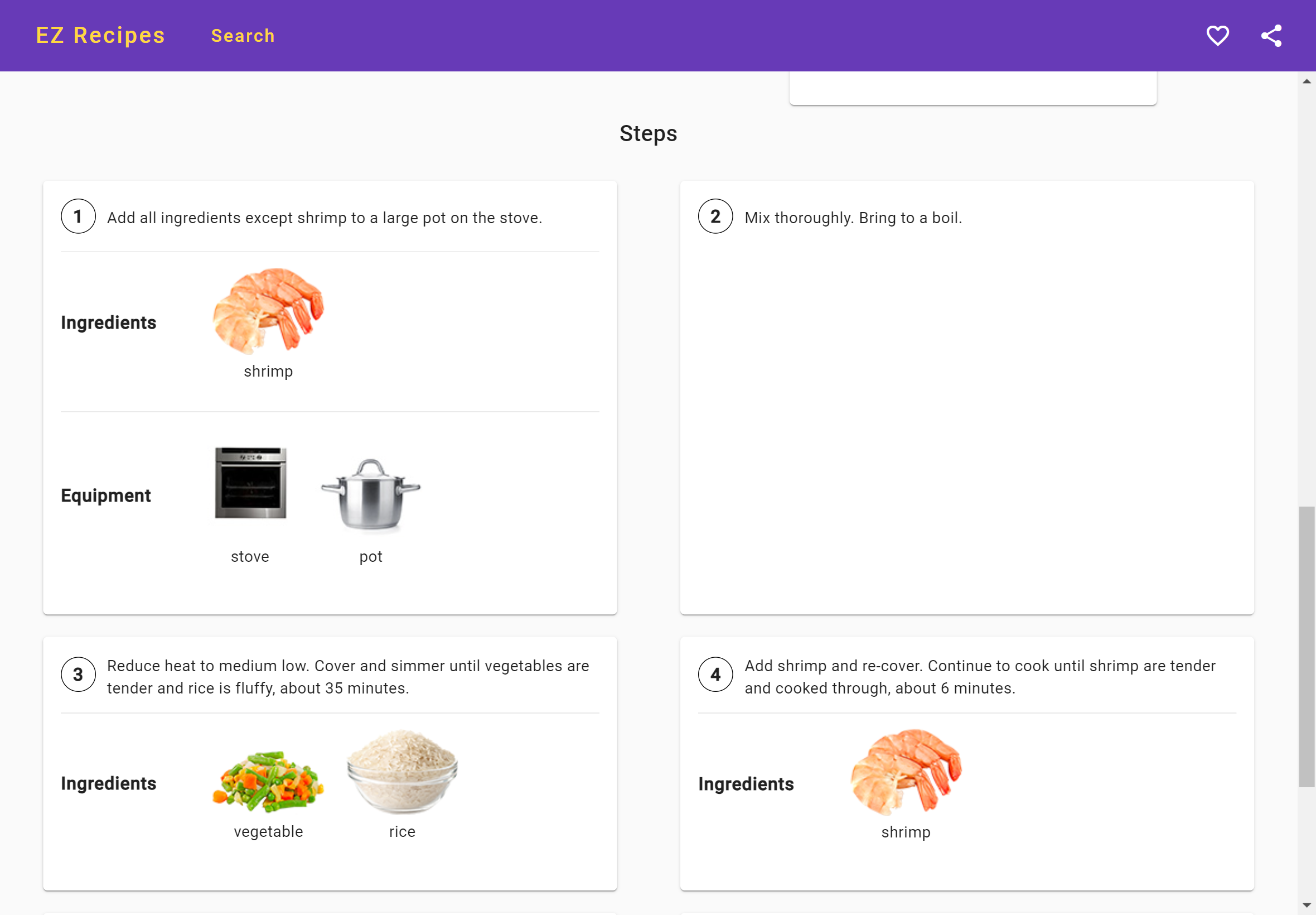Cooking food at home is an essential skill for anyone looking to save money and eat healthily. However, learning how to cook can be daunting, since there are so many recipes to choose from. Even when meal prepping, knowing what ingredients to buy, what equipment is required, and the order of steps to make the meal can be hard to remember for many different recipes. Plus, during busy days, it's nice to be able to cook up something quick and tasty.
Introducing EZ Recipes, an app that lets chefs find low-effort recipes that can be made in under an hour, use common kitchen ingredients, and can produce multiple servings. On one page, chefs can view what the recipe looks like, its nutritional qualities, the total cooking time, all the ingredients needed, and step-by-step instructions showing what ingredients and equipment are required per step. Each recipe can be shared so other chefs can learn how to make the same recipes.
Chefs can either find a random recipe or search for one using various filters, including by name, dietary restrictions, spice level, and meal type.
The app features a glossary to easily look up the meaning of common terms found in recipes. This will better assist newer chefs in learning how to cook, prep certain ingredients, and use certain kitchen tools. Think How to Stock, but for cooking food instead of managing finances.
The site can be visited at https://ez-recipes-web.onrender.com/.
- Single-Page Web Application created using Angular
- TypeScript for type safety and SCSS for enhanced CSS syntax
- Material Design UI
- Responsive and accessible web design
- Best practices for Progressive Web Apps
- Search Engine Optimization (SEO)
- REST APIs to a custom server, which fetches recipe information from spoonacular and MongoDB
- Offline data storage using localStorage and IndexedDB
- Automated testing and deployment using CI/CD pipelines in GitHub Actions
- Containerized development and production environments using Docker
- Mermaid to write diagrams as code
flowchart LR
A(Checkout repository) -->|18.x, 20.x| B(Install Node.js)
B --> C(Install dependencies:\nnpm ci)
C --> D(Lint app:\nnpm run lint)
D --> E(Build app:\nnpm run build --if-present)
E --> F(Run Angular tests:\nnpm test)
flowchart LR
A(Checkout repository) -->|JavaScript| B(Initialize CodeQL)
B --> C(Build code)
C --> D(Perform CodeQL analysis)
flowchart LR
A(Merge PR to main) --> B(Auto-Deploy to Render)
subgraph B [Auto-Deploy to Render]
direction TB
C(Install dependencies:\nnpm install) --> D(Build web app:\nnpm run build)
D --> E(Use Brotli compression)
E --> F(Serve website over HTTPS on a global CDN)
F --> G(Invalidate CDN cache)
end
Source: Render
- Clone this repo.
- Run
npm installto install all the dependencies. - Run
npm startfor a dev server. Navigate tohttp:https://localhost:4200/. The application will automatically reload if you change any of the source files. - In a separate terminal, follow the steps to set up the EZ Recipes server, so the recipes can be fetched locally.
- When done, press
Ctrl-Cto stop the server.
Run npm test to run the unit tests using Karma.
Run npm run lint to lint the entire app using ESLint.
Run npm run build to build the project. The build artifacts will be stored in the dist/ directory. Then run python3 -m http.server -d dist/ez-recipes/ PORT to serve the page over a simple HTTP server. (By default, PORT is 8000.)
To get more help on the Angular CLI use ng help or go check out the Angular CLI Overview and Command Reference page.
- Build the Docker image:
docker build . -t TAG_NAME - Run the image in a container:
docker run --rm -p 4200:4200 -d TAG_NAME - Open
localhost:4200
- Build the Docker image:
docker build . -t TAG_NAME -f Dockerfile.prod - Run the image in a container:
docker run --rm -p 4200:80 -d TAG_NAME - Open
localhost:4200
Run docker kill <container id> to shut down the image when done. The container ID can be found using docker ps.
EZ Recipes is continuously improving! More features will come in the future to enhance the cooking experience, including (but not limited to):
- Accounts so chefs can sync their favorite recipes across all their devices
- The ability to favorite, rate, and view the popularity of recipes
- An enhanced home page showing recently viewed recipes and any recommended/popular recipes
- Showing additional recipe information, such as allergens



